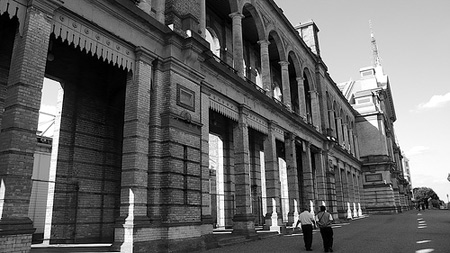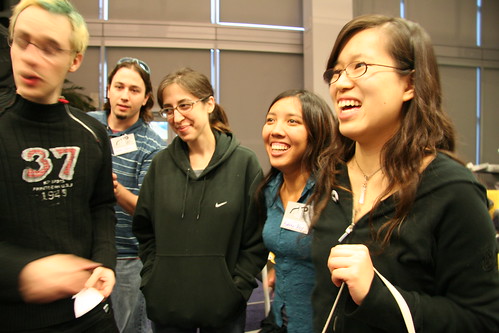God, what an extraordinary weekend! Even after a good night’s sleep, I’m completely exhausted. The last of us left the venue around 11pm last night, tired but pretty euphoric. It’s difficult for me to know what to talk about at this point. Many of us have been working on the project for months, but I think it’s only been in the last week where it’s all come together. And even then, much of the weekend was put together on the flyfixing problems, making sure everyone was okay, dealing with the unexpected.
The thing that sticks in my head most over the last few months is the passion of the people involvedand I mean everyone involved. From the inception of the idea to have a Hack Day for Europe in London through every stage of its implementation. Everyone who gave up their time to do everything from logo design, agree to speak, organise the venue, deal with the legal work, heft boxes around, gently herd the cat flood of contributors, construct and look after the websites, find the money, organise the band, organise the filming, get the staging set up, work out the lighting rigs, talk to security, get the microwave antenna on the roof, sort out the wifi, make sure we had food, source all the schwag, look after the press, sort out health and safety, get the presentations running smoothly, get the blimp crew more heliumI mean, dear God! They deserve bloody medals.
Collectivelyin my opinionall these people managed to create between them the right kind of event. Something that would mean that some of the people we admire most in the world (creative, industrious, fun future-creating technologists) would not only want to come to, but would be able to bring alive. And you did! Hundreds of you came along and demonstrated your ingenuity, your sense of fun, your enthusiasm and your patience. You made rockets, you made widgets, you made blimps. You hacked Nabaztags, tracked satellite flares and fashioned web services out of doodles on paper. You twitched net curtains, made things out of lego and mashed stuff together so that we could all see that it should never have been apart in the first place. You mated television with technology in ways that surely should be illegal. It’s enough to restoreno, that’s wrong, massively amplify anyone’s faith in humanity. Well, mine anyway.
This is already a bit of a sentimental post, but I wanted to catch how it feels right now before I lose it, so sorry if I go off on it all a bit more. It’s going to get long now. Leave while you can…
For me, there are dozens of things that stick in my head. Talking to Matt McAlister on the train from Sunnyvale to San Francisco where he first said, “We should do a Hack Day in London” and where I said, “Yeah we totally should” even while in my head I was thinking, “Ha! We’d never pull that off!”. The first visit to the venue in February with Glenn Bishop, Matt Locke and Matt McAlister (Cashmore got stuck in traffic because of the weather). Announcing the event on my site. Ploughing through infinite applications with Murray Rowan. The revelatory appearance of Anil Patel into the whole proceedings. Meeting the amazing Elaine Pearce! The super-long and pivotal meeting with Amber McCasland, Sarah Mines and Matt Cashmore. The effortless way the speakers came together (and the brilliant work they’ve done). Talking to the London perl mongers and the London Ruby User Group on IRC to explain the event. Endlessly just missing doing an interview for Vitamin. Thefirst time I did a site visit and could tell people why. Seeing Micah Laaker‘s finished logos for the first time. Matt McAlister showing me the Gobos.
And then there was the event set-up and the event itself. Turning up at Alexandra Palace on Friday morning having been juggling Fire Eagle work until midnight the day before, looking at the venue in a certain amount of terror. Watching the stage go up. Participating in the human chain of beanbags. Tom Croucher and Kent Brewster’s epic bag fight. The schwag bag filling production line. Missing the party in Camden. Hefting sofas around. The stunning late-night party at the venue the night before we opened the doors, full of moody lights and Cashmore’s bloody awful Queen / 90s rave music. Writing my Fire Eagle talk at midnight at Tom Loosemore’s house. Seeing people start to arrive on the Saturday morning. Publically showing off Fire Eagle for the first time. The venue being ****ing hit by ****ing lightning in the middle of our talk! The chatter on the radios when we heard. The roof opening and the rain coming in. Staring at the umbrellas dumbstruck. Moving everyone out into the courtyard. Ash Patel handing around sandwiches. All the hackers being absolutely incredibly patient and totally bloody indomitable. Resetting the room and bringing everyone back in again. The hum of activity as people finally get their heads together with functional wifi. Late night widescreen Doctor Who with three hundred of my closest friends. Making people move around too much. Frantically running around before the presentations to troubleshoot, make sure everyone knew what they were doing and make sure that Chad was okay. Trying to set up an amateur faceball tournament on stage so that the judges could have a bathroom break, only to discover that they were all fine. Co-ordinating the timings behind the scenes as we tried to work out if the talks were over or under-running. The ‘gah’ moment of realising we’d screwed up one of the big changes and the incredible work of everyone concerned (but particularly my favourite three guys who sorted out the P.A. system and whom I owe a big fat pint) to get the judging and prizes moved into the food room. The incredible positive energy of all the hackers. The waves of goodwill. And the band! The bloody band!
But weirdly for me, if you were looking for the heart of the event. If you were looking for the absolutely best time that made it all worthwhile for me, it was overnight. It was the period between nine and two am where everyone was doing precisely what they wanted to do. Where the lighting was atmospheric, where the coding was focused and everyone seemed to flow, where the room was gently buzzing with key-strokes. And the experience of all of those people turning around to the stage and running like kids to watch Doctor Who on a huge screen with a hundred of their peers and friends for one of the most extraordinary cliff-hanging episodes of the series was just amazing. It was more like being at home than being at home is.
Well, that’s me done. Thanks so much to everyone involved from the BBC, from Yahoo! and most importantly from everywhere other than the BBC and Yahoo. I’ve made a lot of new friends, caught up with a lot of old friends and been a part of something I don’t think I’m going to forget in a hurry. I couldn’t be prouder of all of us.







